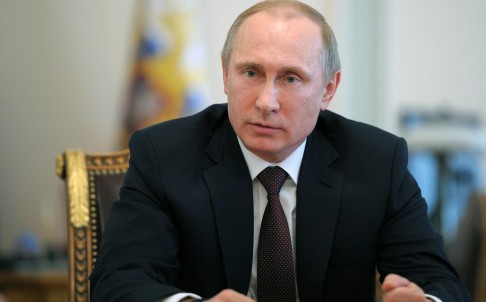Massed army in Ukraine border part of Vladimir Putin's Plan B, analysts say
Russia hopes push for more regional autonomy will give it power of veto over neighbour's plans rather than any repeat of Crimean annexation
PUBLISHED : Monday, 14 April, 2014, 5:15am
UPDATED : Monday, 14 April, 2014, 7:58am
McClatchy-Tribune

Vladimir Putin
Russian President Vladimir Putin has massed tens of thousands of troops along Ukraine's eastern border - a reminder of his vow to protect ethnic Russians in the neighbouring country.
However, using his army is probably Plan B. Rather than repeating the "Crimean scenario" - invading, seizing and annexing territory - the Kremlin would prefer to keep Ukraine weak and divided by forcing a change in how it is governed, analysts say.
Increasing regional autonomy at the expense of the central government would force Ukrainian authorities to constantly balance competing visions of the country to hold it together and, in effect, give Moscow veto power through its influence among ethnic Russians in the east.
Some analysts argue that the idea of regional autonomy reflects Ukraine's complicated geography and should not be dismissed simply because it is being championed by Putin.
Visiting eastern Ukraine on Friday, interim Prime Minister Arseniy Yatsenyuk promised constitutional reforms would give the regions more autonomy.
Moscow is pushing its approach at diplomatic gatherings, such as one planned on Thursday in Geneva. In a sign of its wish to regain influence in Ukraine without sparking war and more sanctions, Moscow agreed to include acting Ukrainian Foreign Minister Andriy Deshchytsia at the meeting with the United States and the European Union, even though the Kremlin considers the interim government illegitimate.
Russian Foreign Minister Sergei Lavrov, in a recent meeting in Paris with US Secretary of State John Kerry, reiterated Russia's desire for Ukraine to maintain "neutrality" - meaning it would never seek to join Nato.
The Russian foreign minister also insisted the troop presence on Ukraine's border was for exercises and Moscow had "absolutely no intention and no interest in crossing the Ukrainian border".
However, analysts believe Putin is keeping his options open in case he fails to sell the idea before Ukraine's May 25 presidential election. "He wants to use the threat of military force to impose a solution," said William Pomeranz, deputy director of the Kennan Institute for Advanced Russian Studies and a professor of Russian law at Georgetown University. "But construction and rewriting of a constitution is a very slow process.
"The big question is, can Putin maintain this pressure and be willing to wait, or will he feel compelled to move while he has military advantage on the ground? That is a decision that one man will make."
Pro-Russia protesters have seized government buildings in the eastern cities of Donetsk, Luhansk and Slavyansk, but have failed to ignite a broader rebellion, Pomeranz noted.
Putin is well aware that an armed invasion would face much greater resistance in the eastern regions than in Crimea, where ethnic Russians hold a majority.
A survey released last Wednesday revealed limited support for the separatists. Only 16 per cent of local people surveyed by the Donetsk Institute for Social Research and Political Analysis said they backed the armed occupation of government buildings, said the Ukrinform news agency.
A Gallup poll carried out for the International Republican Institute last month showed only 4per cent of people questioned in the eastern region wanted to leave Ukraine and join Russia.
One irony of Putin's federalisation project for Ukraine is that he has spent his years as Kremlin leader dismantling Russia's own federal structure in order to centralise power in Moscow.
Since first taking the Kremlin helm in 2000, Putin has engineered the diversion of local tax revenue to Moscow, limited local authority to choose candidates for regional governorships and deployed troops to contain rebellious regions such as Chechnya.
"The Kremlin has an idea of how the Ukraine state should look in the future, and it is determined to make this idea real," said Sergei Utkin, department head of the Russian Academy of Sciences' Centre for Situation Analysis, in Moscow.
He said if the federation project failed, Putin could be forced to implement the more aggressive Plan B, for which the estimated 40,000 troops on the border have been preparing.
